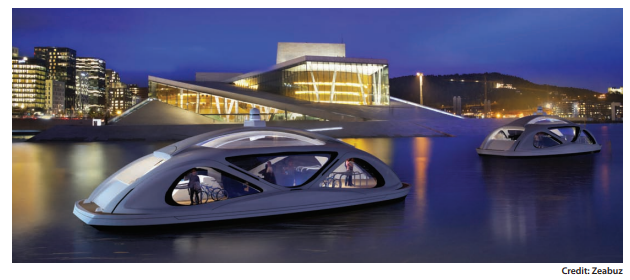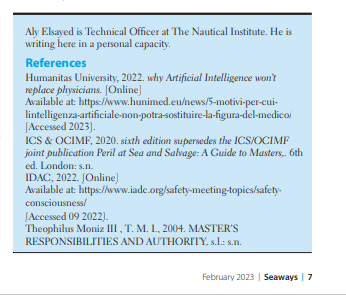Free Seaways Article: MASS - Where is the Master?
Work is in progress on drafting a non-mandatory IMO Code covering the operation of Maritime Autonomous Surface Ships (MASS).
Captain Aly Elsayed AFNI
One of the main objectives is to ensure a level of safety at least equivalent to that expected of a conventional ship.
This paper seeks to establish a critical safety concern regarding the role, responsibility and location of the Master and the Crew during MASS operations, and to highlight the need for adequate crewing as a precautionary principle. Every effort must be made to ensure the safety of life on board, and the need for proper caution is no less important because this is a precautionary and proactive measure. On the contrary; safety of life at sea must not be compromised even during the experimental stage.
MASS – where, and when?
In September 2022, the frst session of the Joint MSC-LEG-FAL Working Group on MASS considered the liability and the responsibilities of the Master and crew in relation to MASS vessels. At this early stage of developing the MASS code, and with no clear definition of MASS in place, the term MASS may refer to:
- ‘uncrewed vessels with humans onboard’;
- ‘remotely controlled ships’ or even
- ‘autonomous ships with humans on board’
The uncertainty of these terms is generating many critical safety concerns, specifically with regard to vessels/ships which may have humans on board. This is particularly a concern because at this early stage, MASS trials may be conducted on a ‘reduced crew’ ship or a ship carrying non-crew members such as industrial personnel, technicians, scientists, or software developers which may or may not carry a Master and crew capable of operating the vessel. It is possible that these trials may take place in areas beyond the reach of immediate emergency response or SAR facilities.
Safety consciousness
Humans are naturally safety-conscious, with an in-built sense of self-preservation, awareness of hazards and alertness to danger. The desire to remain alive and uninjured has a strong impact on the actions of an individual (IDAC, 2022). This is a well-known fact in the shipping sector in general and absolutely part of seafarer safety culture. How many times every day do we hear about a Master refusing to leave the port because weather conditions do not permit safe departure? Or how many times has an offshore vessel returned to base in the middle of an operation because the Master has concerns about the safety of the ship or the people on board (including their own). In addition to the liability and responsibilities the Master holds, self-preservation is a major safety element in the decision-making process.
This kind of safety consciousness is the most potent factor in the prevention of accidents (IDAC, 2022). In uncrewed or crewless vessels or equivalent, this crucial safety factor would not be as effective as it should be – and may even be absent altogether. Consequently, the risks will increase. The safety consciousness factor, or the absence of it, must be considered as a major safety element with regard to the implementation of automated technologies; it is also an element which needs further research.
Levels of risk
If a vessel has humans onboard, no matter what the role of those humans – whether they are involved in the conduct of the vessel or not – then that vessel is of necessity designed, equipped, and has the facilities to accommodate humans on board. The facilities for having a Master and crew on board are therefore in place. It also means that further measures are required to protect those humans, in addition to measures to protect the safety of the environment and the vessel itself.
When the ship is in the open sea and faces an emergency or a critical situation, it will not be possible to provide instant assistance and support in the same way as in port or in coastal waters. Therefore, it is necessary to have a competent person on the spot – in short, a Master – who is capable of taking responsibility to avert or handle the situation and act accordingly to protect lives and prevent or minimise damage to the ship, environment, and cargo (ICS & OCIMF, 2020).
This is not just a question of finding the right technological solution. The world of technology has a considerable array of excellent solutions, but it would be hard for any of them to embody empathy during critical situations. That’s because empathy is all about building trust, listening intently to the other person, paying attention to their capabilities and needs, and being responsive in such a manner that the other person feels understood. No two emergency cases are the same. Each one is entirely different and requires human interaction to respond to those differences. A study by Humanitas University, (2022) indicated that continued improvement of AI and digital solutions means there will be more need, not less, for competent, qualified professionals to handle emergency situations

The Master is in overall command of all personnel and operations aboard the ship. Their authority at sea is supreme and overriding. The Master has the authority and responsibility to make decisions with respect to safety and pollution prevention and to request assistance from the Ship Operations Group or any other appropriate source. (Theophilus Moniz III , 2004).
That said, it should be noted that having a Master in charge of the operation does not in and of itself change the nature of the operation, and in no way invalidates the nature of ‘autonomous’ trials. The Master might have only limited levels of interaction during normal operation, but will have all the overriding authorities and tools to take over at any time, especially to prevent or intervene in an emergency.
The role and responsibilities of the Master are clearly defined in SOLAS Ch. 5 Reg. 34-1 and ISM code. While the role of the Master might change in due course with the expected development in many other areas, no modification is needed at this stage.
Remote operations
Exemptions to the requirement to have a Master on board may be considered by the competent authorities, coastal state, flag states, classification societies and insurers only when all the risks are clearly quantified and emergency response in the operation area is imminently available.
In some circumstances, where the remotely controlled/autonomous vessel is going to operate near the coast or in areas such as oil fields or wind farms, where rescue and emergency response are imminently available, the coastal state and flag state might permit the carriage of humans while the ship/vessel functions are fully controlled from the shore and the ‘person in overall control or the Master’ is located ashore. Similarly, some uncrewed ferries are already in operation, running shuttle traffic across the main channels and waterways.
However, while automated tasks in shipping are improving rapidly, raising the level of expectations for future performance, the operators of remote controlled vessels are still searching for the best method to solve the major connectivity limitations and related reliability and affordability issues. That suggests that at this early stage the level of safety without a Master on board will not be equivalent to the expected level of safety of a conventional ship.
In conclusion
Innovators and policy makers must prioritise protecting lives at sea, especially when the risks of conducting new operations cannot be accurately quantified. Therefore, it is vital that any ship carrying humans at sea for whatever purpose must also carry a Master and Crew unless explicitly exempted by the coastal state and the flag state. The Master shall have all the resources and the overriding decision-making authority to avoid or handle any critical situation.
- The eventual definition of MASS and related topics will affect how the safety of the operation is handled at the experimental and testing stage. At the moment, no such certainty is in place.
- Safety-awareness is an important risk reduction factor, the absence of it is one of the major safety elements concerning unmanned vessels. This is something that needs further research and careful consideration.
- The Master’s roles and responsibilities needs to be clearly considered at this early stage especially for ships which will have humans on-board.
- The Nautical Institute made an intervention during the MASS Working Group at IMO – MSC 106 to highlight the above safety concern.

